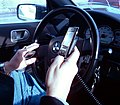Our website is made possible by displaying online advertisements to our visitors.
Please consider supporting us by disabling your ad blocker.
Portal:Telephones

A telephone, colloquially referred to as a phone, is a telecommunications device that enables two or more users to conduct a conversation when they are too far apart to be easily heard directly. A telephone converts sound, typically and most efficiently the human voice, into electronic signals that are transmitted via cables and other communication channels to another telephone which reproduces the sound to the receiving user. The term is derived from Ancient Greek: τῆλε, romanized: tēle, lit. 'far' and φωνή (phōnē, voice), together meaning distant voice.
In 1876, Alexander Graham Bell was the first to be granted a United States patent for a device that produced clearly intelligible replication of the human voice at a second device. This instrument was further developed by many others, and became rapidly indispensable in business, government, and in households. (Full article...)

A mobile phone, or cell phone, is a portable telephone that allows users to make and receive calls over a radio frequency link while moving within a designated telephone service area, unlike fixed-location phones (landline phones). This radio frequency link connects to the switching systems of a mobile phone operator, providing access to the public switched telephone network (PSTN). Modern mobile telephony relies on a cellular network architecture, which is why mobile phones are often referred to as 'cell phones' in North America. (Full article...)
A smartphone is a mobile device that combines the functionality of a traditional mobile phone with advanced computing capabilities. It typically has a touchscreen interface, allowing users to access a wide range of applications and services, such as web browsing, email, and social media, as well as multimedia playback and streaming. Smartphones have built-in cameras, GPS navigation, and support for various communication methods, including voice calls, text messaging, and internet-based messaging apps. (Full article...)
Selected article -

Tip and ring are the two conductors, or sides. of a telephone line. Their names are derived from the telephone plugs used for connecting telephone calls in manual switchboards. One side of the line is connected to the metal tip of the plug, and the second is connected to a metal ring behind the tip, separated and insulated from the tip by a non-conducting material. When inserted into a jack, the plug's tip conductor connects first, followed by the ring conductor. In many European countries, tip and ring are referred to as the A and B wires.
Neither of the conductors is permanently connected to earth, but one may be connected to earth during signaling operations. Typically, the ring conductor has a direct current (DC) potential of −48V to −52V with respect to the tip conductor when the line is in the on-hook (idle) state. Floating both conductors, i.e. not referencing either one to ground, minimizes the effect of interference from any nearby alternating current (AC) power wires. (Full article...)
Types of phones -
The Reis telephone was an invention named after Philipp Reis of a telephone-like device he constructed. Reis's first successful work is dated to October 1861. It was the first device to transmit a voice via electronic signals and for that the first modern telephone. Reis also coined the term. (Full article...)
Selected audio -
A red box is a phreaking device that generates tones to simulate inserting coins in pay phones, thus fooling the system into completing free calls. In the United States, a nickel is represented by one tone, a dime by two, and a quarter by a set of five. Any device capable of playing back recorded sounds can potentially be used as a red box. Commonly used devices include modified Radio Shack tone dialers, personal MP3 players, and audio-recording greeting cards. (Full article...)
List articles

- Comparison of smartphones
- List of best-selling mobile phones
- List of countries by number of broadband Internet subscriptions
- List of countries by number of telephone lines in use
- List of countries by smartphone penetration
- List of country calling codes
- List of iPhone models
- List of mobile network operators
- List of mobile phone brands by country
- List of mobile phone generations
- List of telecommunications companies
Related portals
General images -
Selected biography
Thomas C. Cowherd (March 20, 1817 – April 4, 1907) was a British-born tinsmith and poet, and father to 16 children in Brantford, Ontario, Canada, including James H. Cowherd, the second earliest manufacturer of telephones to Alexander Graham Bell. (Full article...)
Selected images
Topics
Subcategories

More
 |
Here are some tasks awaiting attention:
|
Telephones in the news
No recent news
Associated Wikimedia
The following Wikimedia Foundation sister projects provide more on this subject:
-
Commons
Free media repository -
Wikibooks
Free textbooks and manuals -
Wikidata
Free knowledge base -
Wikinews
Free-content news -
Wikiquote
Collection of quotations -
Wikisource
Free-content library -
Wikiversity
Free learning tools -
Wiktionary
Dictionary and thesaurus
Previous Page Next Page

















































































































